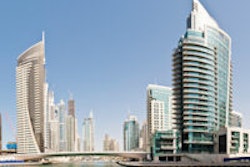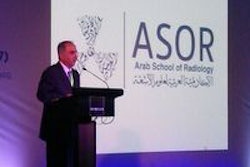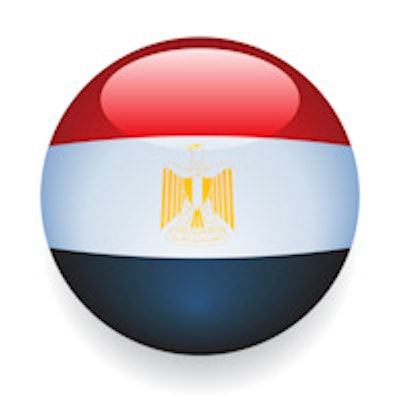
Ongoing security concerns and travel restrictions in Egypt have forced the organizers of next year's International Congress of Radiology (ICR) to change the location from Sharm El Sheikh to Dubai, United Arab Emirates. The meeting is now likely to be held in early September, instead of May as planned.
The International Society of Radiology (ISR) proposed the change, and it was approved last Friday at the general assembly of the Egyptian Society of Radiology and Nuclear Medicine (ESRNM) held in Cairo. Around 130 members attended.
 Dr. Tarek El-Diasty, president of the ESRNM, was an honorary member of the 2013 European Congress of Radiology (ECR) in Vienna.
Dr. Tarek El-Diasty, president of the ESRNM, was an honorary member of the 2013 European Congress of Radiology (ECR) in Vienna.
"There was universal support for the decision to relocate the congress to Dubai," said Dr. Tarek El-Diasty, president of the ESRNM and head of radiology at the Urology and Nephrology Center of Mansoura University in Mansoura, Egypt. "We explained to attending members about the background, advantages, and limitations of that change as well as all steps and work that have been done up till now. We got their approval."
The plan is for the whole meeting, including the scientific program, to transfer to Dubai. The provisional dates are 9-12 September, and the World Trade Center is the most likely venue, according to ISR president Dr. Jan Labuscagne.
"The character of the congress will stay the same, and it will be an Egyptian not a United Arab Emirates meeting," he said. "We don't want to reinvent the wheel. The entire organizing committee will be the same."
Fewer Egyptians are now likely to attend ICR 2014 and the relatively high cost of Dubai's hotels will be a challenge for delegates, according to Labuscagne, but on the plus side, he thinks more international visitors will now attend. Also, the September timing should avoid any possible conflict with the highly successful Arab Health meeting, which is held annually in Dubai in late January and has coverage of medical imaging.
The decision was particularly difficult for Labuscagne because he proposed Egypt as the location for ICR 2014 more than three years ago, when the political situation was much more promising and there was great optimism about the future.
"The 'Peaceful Revolution' gave everybody hope and made us think the transition would be easy, but nobody could foresee the events that were to follow," he said. "While we all sincerely hope that the situation will remain and become more and more stable, we cannot gamble on that, and hence the decision. We also need enough time to get the logistics and marketing right, so we needed to decide now."
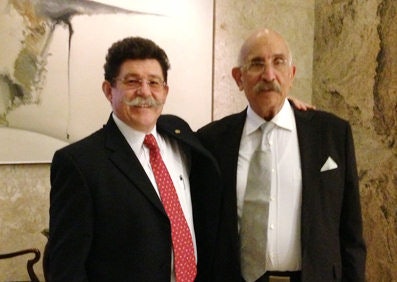 Dr. Jan Labuscagne (left) has made it a key objective to promote good relations between the global radiological community and the Middle East. He is shown here with Dr. Hassen Gharbi from Tunisia, who is a member of the ISR Executive Committee and president of the World Federation of Ultrasound in Medicine and Biology. Image courtesy of ISR.
Dr. Jan Labuscagne (left) has made it a key objective to promote good relations between the global radiological community and the Middle East. He is shown here with Dr. Hassen Gharbi from Tunisia, who is a member of the ISR Executive Committee and president of the World Federation of Ultrasound in Medicine and Biology. Image courtesy of ISR.When deciding on the best course of action, one option was to change the date and leave the venue the same, but that would have meant just postponing the inevitable, he added. Another option was to do nothing, but he felt that was unacceptable.
Labuscagne hopes that either ICR 2020 or ICR 2022 will take place in Egypt. This issue will be discussed at the ISR's executive committee meeting to be held during the upcoming RSNA 2013 meeting in Chicago.
"As compensation for the many young radiologists in Egypt who may now not be able to attend ICR 2014, we have offered to have another meeting in Egypt in the foreseeable future, hence the mention of 2020. That is not final yet, and it may be 2022," he explained. "The current leadership will still be active then and won't have retired."
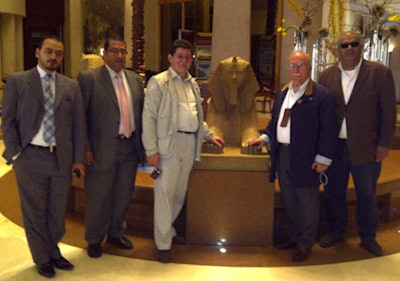 Dr. Jan Labuscagne and ISR's past President Dr. Nicholas Gourtsoyiannis (to right of statue) made a site inspection to Egypt in January 2011. They met the local organizers, including Dr. Emad Naguib (chairman of ICR 2014 Organizing Committee), who is shown on the right. Image courtesy of Walid Menessi, Icom, Alexandria, Egypt.
Dr. Jan Labuscagne and ISR's past President Dr. Nicholas Gourtsoyiannis (to right of statue) made a site inspection to Egypt in January 2011. They met the local organizers, including Dr. Emad Naguib (chairman of ICR 2014 Organizing Committee), who is shown on the right. Image courtesy of Walid Menessi, Icom, Alexandria, Egypt.Labuscagne's term as ISR president looks set to last until September 2014. Five years ago, he moved from his native South Africa to become a private-sector radiologist based in Bunbury, Western Australia. He was appointed president at ICR 2012 in São Paulo, Brazil, where he succeeded Dr. Nicholas Gourtsoyiannis from Iraklion, Crete.





